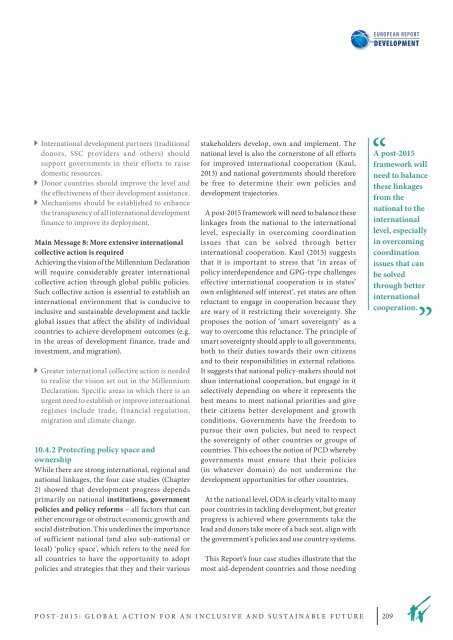Post 2015: Global Action for an Inclusive and Sustainable Future
Post 2015: Global Action for an Inclusive and Sustainable Future
Post 2015: Global Action for an Inclusive and Sustainable Future
Create successful ePaper yourself
Turn your PDF publications into a flip-book with our unique Google optimized e-Paper software.
International development partners (traditional<br />
donors, SSc providers <strong>an</strong>d others) should<br />
support governments in their ef<strong>for</strong>ts to raise<br />
domestic resources.<br />
Donor countries should improve the level <strong>an</strong>d<br />
the effectiveness of their development assist<strong>an</strong>ce.<br />
mech<strong>an</strong>isms should be established to enh<strong>an</strong>ce<br />
the tr<strong>an</strong>sparency of all international development<br />
fin<strong>an</strong>ce to improve its deployment.<br />
Main Message 8: More extensive international<br />
collective action is required<br />
achieving the vision of the millennium Declaration<br />
will require considerably greater international<br />
collective action through global public policies.<br />
Such collective action is essential to establish <strong>an</strong><br />
international environment that is conducive to<br />
inclusive <strong>an</strong>d sustainable development <strong>an</strong>d tackle<br />
global issues that affect the ability of individual<br />
countries to achieve development outcomes (e.g.<br />
in the areas of development fin<strong>an</strong>ce, trade <strong>an</strong>d<br />
investment, <strong>an</strong>d migration).<br />
Greater international collective action is needed<br />
to realise the vision set out in the millennium<br />
Declaration. Specific areas in which there is <strong>an</strong><br />
urgent need to establish or improve international<br />
regimes include trade, fin<strong>an</strong>cial regulation,<br />
migration <strong>an</strong>d climate ch<strong>an</strong>ge.<br />
10.4.2 Protecting policy space <strong>an</strong>d<br />
ownership<br />
While there are strong international, regional <strong>an</strong>d<br />
national linkages, the four case studies (chapter<br />
2) showed that development progress depends<br />
primarily on national institutions, government<br />
policies <strong>an</strong>d policy re<strong>for</strong>ms – all factors that c<strong>an</strong><br />
either encourage or obstruct economic growth <strong>an</strong>d<br />
social distribution. this underlines the import<strong>an</strong>ce<br />
of sufficient national (<strong>an</strong>d also sub-national or<br />
local) ‘policy space’, which refers to the need <strong>for</strong><br />
all countries to have the opportunity to adopt<br />
policies <strong>an</strong>d strategies that they <strong>an</strong>d their various<br />
stakeholders develop, own <strong>an</strong>d implement. the<br />
national level is also the cornerstone of all ef<strong>for</strong>ts<br />
<strong>for</strong> improved international cooperation (Kaul,<br />
2013) <strong>an</strong>d national governments should there<strong>for</strong>e<br />
be free to determine their own policies <strong>an</strong>d<br />
development trajectories.<br />
a post-<strong>2015</strong> framework will need to bal<strong>an</strong>ce these<br />
linkages from the national to the international<br />
level, especially in overcoming coordination<br />
issues that c<strong>an</strong> be solved through better<br />
international cooperation. Kaul (2013) suggests<br />
that it is import<strong>an</strong>t to stress that ‘in areas of<br />
policy interdependence <strong>an</strong>d GpG-type challenges<br />
effective international cooperation is in states’<br />
own enlightened self interest’, yet states are often<br />
reluct<strong>an</strong>t to engage in cooperation because they<br />
are wary of it restricting their sovereignty. She<br />
proposes the notion of ‘smart sovereignty’ as a<br />
way to overcome this reluct<strong>an</strong>ce. the principle of<br />
smart sovereignty should apply to all governments,<br />
both to their duties towards their own citizens<br />
<strong>an</strong>d to their responsibilities in external relations.<br />
It suggests that national policy-makers should not<br />
shun international cooperation, but engage in it<br />
selectively depending on where it represents the<br />
best me<strong>an</strong>s to meet national priorities <strong>an</strong>d give<br />
their citizens better development <strong>an</strong>d growth<br />
conditions. Governments have the freedom to<br />
pursue their own policies, but need to respect<br />
the sovereignty of other countries or groups of<br />
countries. this echoes the notion of pcD whereby<br />
governments must ensure that their policies<br />
(in whatever domain) do not undermine the<br />
development opportunities <strong>for</strong> other countries.<br />
at the national level, oDa is clearly vital to m<strong>an</strong>y<br />
poor countries in tackling development, but greater<br />
progress is achieved where governments take the<br />
lead <strong>an</strong>d donors take more of a back seat, align with<br />
the government’s policies <strong>an</strong>d use country systems.<br />
this report’s four case studies illustrate that the<br />
most aid-dependent countries <strong>an</strong>d those needing<br />
poSt-<strong>2015</strong>: <strong>Global</strong> actIon For <strong>an</strong> IncluSIvE <strong>an</strong>D SuStaInablE FuturE<br />
A post-<strong>2015</strong><br />
framework will<br />
need to bal<strong>an</strong>ce<br />
these linkages<br />
from the<br />
national to the<br />
international<br />
level, especially<br />
in overcoming<br />
coordination<br />
issues that c<strong>an</strong><br />
be solved<br />
through better<br />
international<br />
cooperation.<br />
209

















